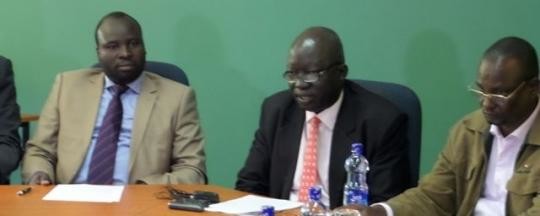The Sudan People’s Liberation Movement (in-Opposition), the rebel group led by Riek Machar, has criticized the ‘rush’ to form of a national unity government in South Sudan. East African mediators and diplomats of other countries have been pushing for a compromise deal.
SPLM-IO also voiced reluctance to enter into any kind of a power-sharing arrangement with the SPLM-Juba faction led by President Salva Kiir, instead declaring him to be the leader of “dictatorial tyrannical forces of tribalism, parochialism, chauvinism, and corruption.”
On 10 June, the leader of SPLM-IO Riek Machar agreed with President Kiir to finalize talks on the formation of a national unity government by mid-August.
Machar also on 9 May signed an agreement to end the conflict in the country, which stated, “a transitional government of national unity will offer the best chance for the people of South Sudan to take the country forward.”
In spite of these earlier commitments, the rebel negotiating team in Addis Ababa boycotted two days of IGAD attempts to re-launch the peace talks on 20 and 21 June.
At that time the rebels explained that their boycott was in protest of the manner by which the non-government participants were selected for talks, including SPLM former detainees, other political parties, civil society and faith-based organizations.
In a press release on Sunday, the SPLM-IO escalated its criticism of Kiir and of the mediation process itself, expressing unwillingness to enter into any kind of unity government with President Kiir and his loyalists, calling them ‘evil forces.’
“We in the SPLM/A have failed to understand why some quarters inside and outside South Sudan trivialize the conflict as power struggle between President Kiir and H.E. Dr. Riek Macher Teny and rush to think that power sharing or government of national unity is the best solution to the socio political and economic malaise of the country.”
“This is a grave historical misconception. Any formation of a government of national unity today in Juba without addressing the underlying socio political and economic predicaments through an open, frank negotiated settlement between the warring parties, will lead to a quick relapse to further violence and turmoil in the country,” reads the press release.
Oyet Nathaniel Pierino, the author of the press release and the newly appointed head of SPLM-IO’s Committee for Political Mobilizaiton added, “IGAD and the international community should understand the dynamics of the conflict and the reality of this crisis as a national crisis engendered by bad leadership under President Salva Kiir and his cohorts.”
He accused Kiir and his followers of wanting to prolong the conflict in order to evade justice and accountability.
Oyet added, “The problem of South Sudan is not a given tribe or ethnic group but a bad system of rule, a poor and negative mindset and pattern of politics promoted by certain individuals who have taken the country hostage by treating it as a private and tribal entity and this is being resisted by all South Sudanese people in regardless of where they come from.”
He warned, “If these evil forces are left to run the state, the problem of South Sudan is far from over. IGAD and international community should rethink their strategy in resolving the conflict in South Sudan.”
“President Salva Kiir must be forced to step aside or relegated to give way to much needed reforms and sustainable peace in South Sudan or else there will be general but different revolts in the country.”
Kiir himself has declared his own position as president a ‘red line’ and non-negotiable. In a speech to parliament last week he said that neither he as the elected president would step down nor should the parliament be dissolved.
He made a similar statement at the signing of the 9 May agreement, saying, “I am the president, to everybody. Those who are against me, and those who support me. I am the president of South Sudan, and I must always remain in that position as the president. The leader of that country.”
On the other hand his rival, Riek Machar, has expressed willingness to stay out of a unity government.
Related:
Kiir and Machar commit to talks on interim government (11 June)
Full text: ‘Agreement to Resolve the Crisis in South Sudan’ (10 May)
Politics: ‘If Kiir steps down, we will stop fighting’ (26 March)
File photo: Oyet Nathaniel Pierino (far left) with Taban Deng (right), leader of the SPLM/A opposition negotiating team in Addis Ababa




